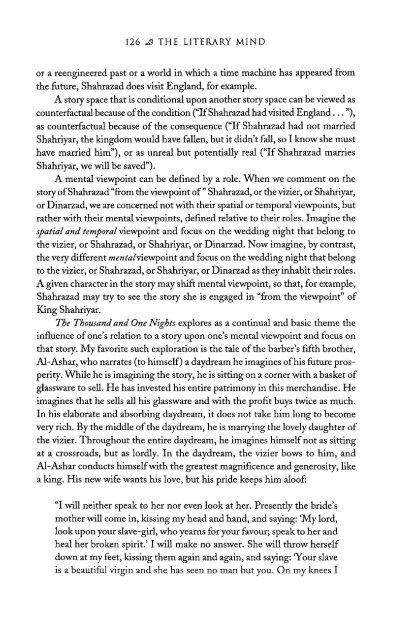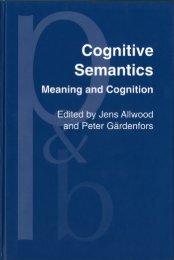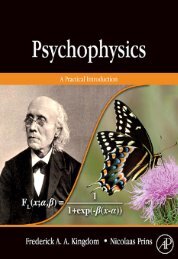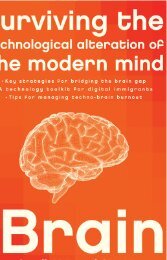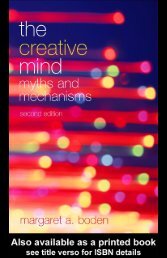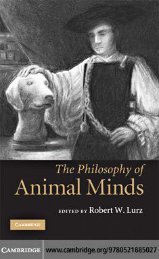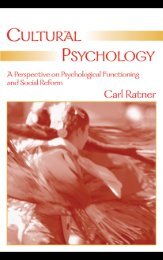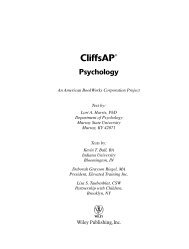The Literary Mind.pdf
The Literary Mind.pdf
The Literary Mind.pdf
Create successful ePaper yourself
Turn your PDF publications into a flip-book with our unique Google optimized e-Paper software.
126 THE LITERARY MIND<br />
or a reengineered past or a world in which a time machine has appeared from<br />
the future, Shahrazad does visit England, for example.<br />
A story space that is conditional upon another story space can be viewed as<br />
counterfactual because of the condition ("If Shahrazad had visited England..."),<br />
as counterfactual because of the consequence ("If Shahrazad had not married<br />
Shahriyar, the kingdom would have fallen, but it didn't fall, so I know she must<br />
have married him"), or as unreal but potentially real ("If Shahrazad marries<br />
Shahriyar, we will be saved").<br />
A mental viewpoint can be defined by a role. When we comment on the<br />
story of Shahrazad "from the viewpoint of " Shahrazad, or the vizier, or Shahriyar,<br />
or Dinarzad, we are concerned not with their spatial or temporal viewpoints, but<br />
rather with their mental viewpoints, defined relative to their roles. Imagine the<br />
spatial and temporal viewpoint and focus on the wedding night that belong to<br />
the vizier, or Shahrazad, or Shahriyar, or Dinarzad. Now imagine, by contrast,<br />
the very different mental viewpoint and focus on the wedding night that belong<br />
to the vizier, or Shahrazad, or Shahriyar, or Dinarzad as they inhabit their roles.<br />
A given character in the story may shift mental viewpoint, so that, for example,<br />
Shahrazad may try to see the story she is engaged in "from the viewpoint" of<br />
King Shahriyar.<br />
<strong>The</strong> Thousand and One Nights explores as a continual and basic theme the<br />
influence of one's relation to a story upon one's mental viewpoint and focus on<br />
that story. My favorite such exploration is the tale of the barber's fifth brother,<br />
Al-Ashar, who narrates (to himself) a daydream he imagines of his future prosperity.<br />
While he is imagining the story, he is sitting on a corner with a basket of<br />
glassware to sell. He has invested his entire patrimony in this merchandise. He<br />
imagines that he sells all his glassware and with the profit buys twice as much.<br />
In his elaborate and absorbing daydream, it does not take him long to become<br />
very rich. By the middle of the daydream, he is marrying the lovely daughter of<br />
the vizier. Throughout the entire daydream, he imagines himself not as sitting<br />
at a crossroads, but as lordly. In the daydream, the vizier bows to him, and<br />
Al-Ashar conducts himself with the greatest magnificence and generosity, like<br />
a king. His new wife wants his love, but his pride keeps him aloof:<br />
"I will neither speak to her nor even look at her. Presently the bride's<br />
mother will come in, kissing my head and hand, and saying: 'My lord,<br />
look upon your slave-girl, who yearns for your favour; speak to her and<br />
heal her broken spirit.' I will make no answer. She will throw herself<br />
down at my feet, kissing them again and again, and saying: 'Your slave<br />
is a beautiful virgin and she has seen no man but you. On my knees I


